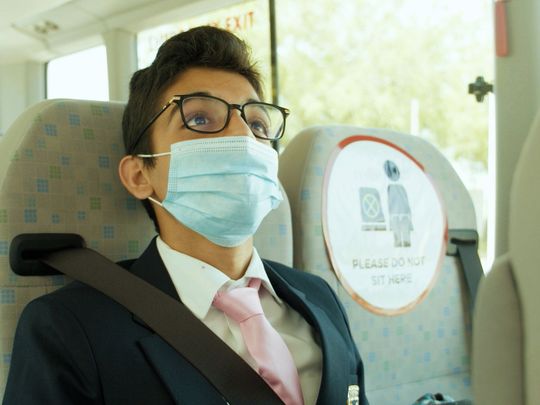
Dubai: As students and parents prepare for the resumption of face-to-face classes across the UAE from Sunday, August 29, providers of school transport services have ensured all health and precautionary measures are in place.
Dubai Taxi Corporation (DTC) at Roads and Transport Authority (RTA) has recently increased the number of school buses in operation to as many as 440. “Beefing up the fleet will provide safe and smooth school transport services for students and encourage parents to switch to school buses rather than use private vehicles in transporting their children,” RTA explained.
RTA said it has taken extensive measures to ensure safety on buses.
While we can expect to have more school buses on the streets of Dubai this upcoming school year, as compared to the last academic year, transport operators said buses will operate at 50 per cent capacity to enforce physical distancing. Mansour Rahma Al Falasi, CEO of DTC, said: “We have taken extensive precautionary measures to ensure the safety of students such as sanitising school buses before and after the boarding of students and limiting the usable seats to 50 per cent of capacity. Through these measures, we intend to comply with the local and global practises of curbing the spread of COVID-19 and ensure that students are well-protected and feel happy during their journeys to and from schools.”
He added: “The total number of students registered for school transport service has reached 7,300. These students are serviced by 440 DTC school buses. We signed contracts with 22 schools in Dubai, which are now serviced by quality school transport services. The success of the service is also attributed to the careful selection of highly competent drivers and attendants, who are well-trained,” he added.
Trained for first aid
Al Falasi said their staff have been trained on handling emergency cases and were certified by Dubai Corporation for Ambulance Services to administer first aid. He added: “School buses are also fitted with hi-tech devices for monitoring and tracking both buses and students. Devices include cameras and sensors to ensure no student is left behind in the bus. There is also an emergency button to communicate with the control centre, a GPS-based electronic tracking system, radio-frequency identification (RFID) system and a self-extinguishing engine system. All these features have been selected to conform to the highest global safety standards.”
Parents can also track the movement of the bus and students to figure out the pick-up and drop-off points and timings. They can visit the DTC website to request the service and get detailed information.
Easing of seating restrictions
Privately-owned transport providers have also assured that bus safety and sanitisation protocol will be enforced to ensure the health and safety of students and staff. They also welcomed the easing of seating restrictions.
Steve Burnell, School Transport Services (STS) group managing director, told Gulf News on Wednesday: “We are incredibly pleased with the easing of seating restrictions on school buses and the new academic programmes for the new term. These changes will have a positive impact with the increasing numbers of students returning to school buses with STS.”
“We remain focused on the importance of our bus safety and sanitisation protocol, which also ensure the health and safety of our students and employees. Our drivers and bus guardians provide excellent safety practises to ensure that our students are monitored on every journey.”
Burnell noted that the pandemic had brought “a lot of changes to society and certainly parents want to have the extra reassurance that their children are being transported in the safest way possible.” He said: “The safety protocol includes pre-trip bus sanitisation, social distancing of students before boarding, following the face mask mandate, maintaining personal hygiene, running temperature checks, scanning of smart bus ID cards, monitoring student welfare, following seat belt mandate, post-trip bus sanitisation. In addition, our intelligent bus technology ensures that we can monitor and track students when they are onboard our vehicles. This, in turn, provides a high level of assurance to parents and schools,” Burnell added.
Keeping the roads safe
Road safety expert Thomas Edelmann, founder and managing director of RoadSafetyUAE, meanwhile, highlighted the renewed focus on keeping the roads free from accidents.
He said: “It is vital to teach our children the right and safe school bus behaviour.” He shared the following safety reminders for students, parents, guardians and motorists:
■ Don’t stand in the danger zone (if a child can touch the bus, he or she is too close!)
■ Take your seat promptly, buckle up and sit properly, facing forward at all times.
■ Keep the aisle of the bus clear at all times. Always keep your head, hands and arms inside the bus. Remain in the seat until the bus comes to a complete stop.
■ Always listen to the directions of the school bus driver and school bus attendants. They are the experts and their word needs to be followed the same way as those of the teachers.
■ Obey the yellow warning sign and flashing red lights on school buses when they stop, allowing students to get on or off.
■ You must stop to allow safe passage for students.
■ Be very cautious of students appearing in front or at the back of the bus, wanting to cross the street.
■ Be cautious of students crossing the street to reach the bus.
■ Watch your speed and be ready to stop.
■ On the road, be polite and generous to school buses, do no cut in front of them. Show a caring attitude for the children they transport.
■ Expect a lot of traffic around schools, especially in the mornings and afternoons.
■ Watch out for extra traffic guidance and follow the directions of school staff, traffic guides or the police.
■ Drivers dropping or collecting pupils must not obstruct traffic.
■ Care for other motorists like you want to be cared for yourself.
■ Park your vehicle safely, even if that means parking a few steps away from the school. A short walk is for you and your children.
■ Don’t park in non-designated areas.
■ Parents should observe time management and start early.
■ Parents dropping or collecting children should guide them on safety instructions to reach the school or vehicle safely.
■ Children learn from their parents, so be a role model for road safety, especially around schools.
■ Parents must educate their children about proper road safety conduct around schools and in general.
■ If you have improvement proposals for your school, engage with the school administration to articulate those.
School bus safety protocol:
- Conduct pre-trip bus sanitisation.
- Observe social distancing of students prior to boarding.
- Follow face mask mandate.
- Practise personal hygiene.
- Monitor student welfare.
- Run temperature checks.
- Enforce smart bus ID card scanning.
- Observe social distancing.
- Follow seat belt mandate.
- Have social distancing upon de-boarding.
- Conduct post-trip bus sanitisation.
‘A Day Without Accidents’
Dubai Police have also urged motorists to observe ‘A Day Without Accidents’ on the first day of the new academic year.
Brigadier Saif Muhair Al Mazroui, Director of the General Department of Traffic at Dubai Police, said the campaign this year will carry the slogan ‘Together for Safer Roads’. He said the campaign is about raising awareness on the importance of adhering to traffic laws and speed limits, fastening of seat belts while driving, leaving a safe distance between vehicles, not using mobile phones while driving and giving way to pedestrians and emergency vehicles.
He added: “It’s extremely important that we continue to sustain the safety awareness initiatives, particularly when our dear pupils return to schools.”










